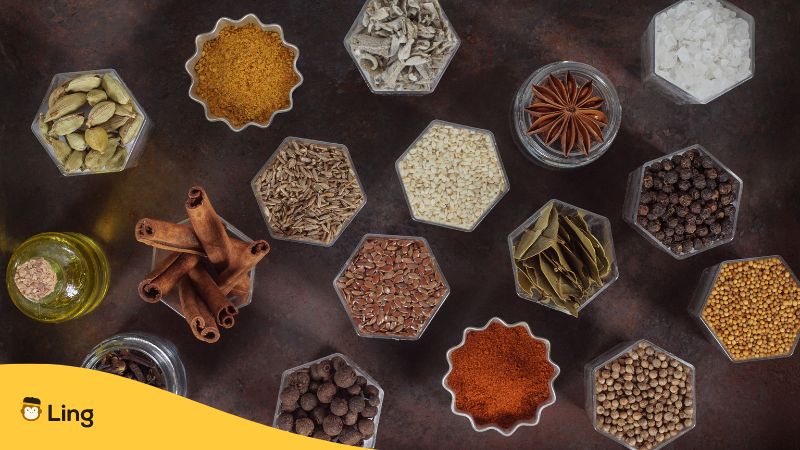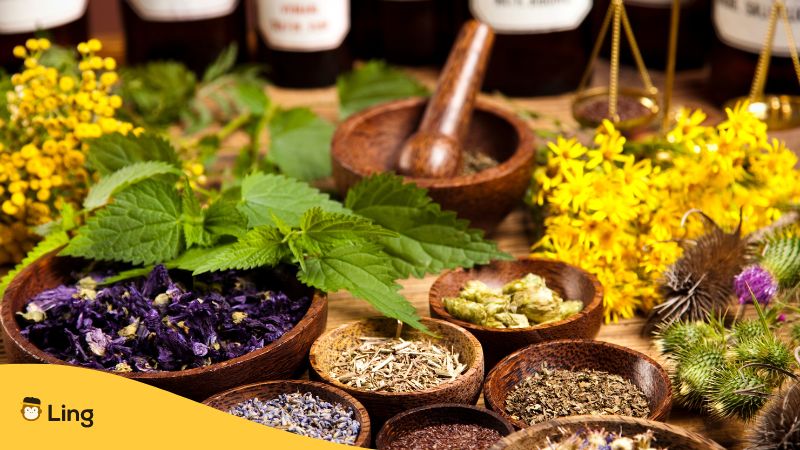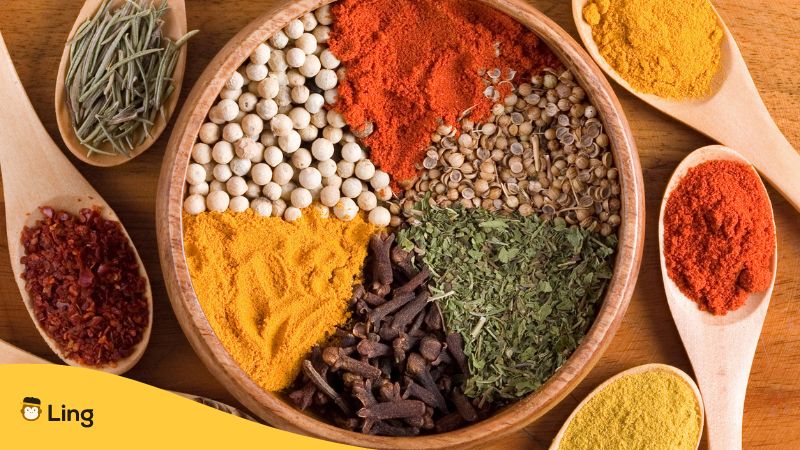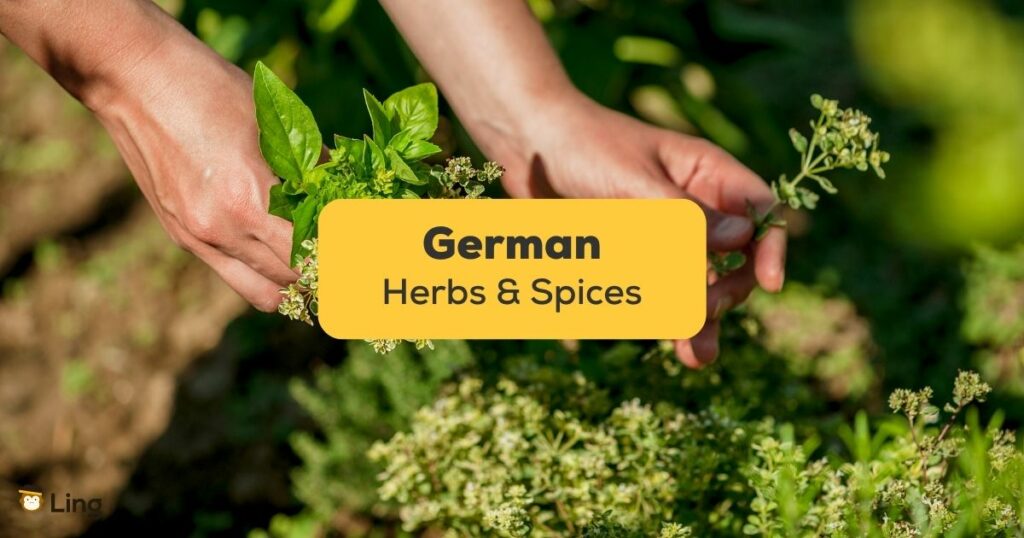Ready to plunge into the aromatic world of German herbs and spices? Well, it’s about time you get to know them up close and personal, as they’re the heart and soul of their cuisine! In this post, we’ll go over these common flavor boosters used by German cooks and how you can use some of them in actual sentences. Let’s begin!
Ever tried donning the chef’s hat and recreating your favorite German recipes? Oh, if you’ve been lucky enough to savor the real deal, you’ll instantly appreciate the grand orchestra of Kräuter (herbs) and Gewürze (spices) playing in every mouthful. It’s like the hidden secret handshake of German culinary traditions, right?
Now, I’m no Gordon Ramsay but trust me, my tastebuds have journeyed through the land of Bratwurst and Sauerkraut enough to spot an imposter from a mile off! Do you know how I know? The trick is to savory every bite to get a sense of the herbs and spices used! If there’s a hint of sweet paprika, caraway seeds, and pepper, there’s a huge chance that the chef followed an authentic German recipe!
You see, German cuisine is renowned for its rich and diverse flavors, and at the heart of this culinary tradition lie the vibrant herbs and spices used in their dishes. From hearty stews to traditional sausages, herbs and spices are used by the locals to add depth, aroma, and character to countless recipes. So if you want to speak with the locals about their food, one topic you can focus on is the world of herbs and spices.
Ready to expand your vocab in German? If yes, then let’s go over the top translations for the herbs and spices in the section below!

Popular German Herbs And Spices
Parsley (die Petersilie)
Ah, the vibrant green sprinkles you see on German Potato Salad! That’s Parsley, folks! Known for its fresh, slightly peppery taste, this staple herb in German cooking adds that ‘oomph’ factor to soups and stews. Plus, it’s a power pack of vitamins and minerals, enhancing your meal’s nutritional value. Try it in a German-style Goulash for a herbal pop!
Dill (der Dill)
Dill, with its feathery leaves and delicate aroma, is an all-star in the German kitchen. From seasoning fish to pickling cucumbers or brightening up a sauce, its tangy, slightly sweet note is a culinary game-changer. Looking for a recipe? Try the German Cucumber-Dill Salad (Gurkensalat).
Thyme (der Thymian)
Thyme is a versatile little herb that punches above its weight in German cuisine. Earthy, slightly minty, it’s a perfect companion for roasted meats, potatoes, and vegetables. Try adding Thyme to your next Sauerbraten (Pot Roast) and taste the magic unfold.
Marjoram (der Majoran)
Majoran is the German cousin of oregano and a culinary superstar. It brings a sweet, floral taste, much like a blend of thyme and oregano. Think sausages, meat dishes, and bread – all uplifted by Marjoram’s enchanting aroma.
Caraway Seeds (der Kümmel)
Caraway seeds are an essential spice in German cuisine, delivering a distinct anise-like flavor. These seeds are frequently used in bread, sauerkraut, and cheese dishes. Caraway seeds not only enhance the taste but also aid digestion, making them a valuable addition to German recipes.
Mustard Seeds (das Senfkorn)
Mustard seeds are a staple spice in German cooking, known for their pungent and tangy flavor. Ground mustard seeds are used to make the famous German mustard, a condiment that pairs perfectly with sausages and pretzels. The sharp and zesty taste of mustard seeds adds a delightful kick to various dishes.
Cummin (der Kreuzkümmel)
A spice with an earthy, warm character, Cummin is often seen playing a supporting role in many German dishes, adding depth and complexity to the flavor profile. Next time you’re whipping up a hearty German stew, don’t forget to add a pinch!
Pepper (der Pfeffer)
Where would German cuisine be without the trusty Pfeffer? Adding warmth and a punch to every dish it touches, black Pepper is a must-have in the German kitchen. A generous sprinkle of this on your Schnitzel can bring it alive!
Nutmeg (die Muskatnuss)
Nutmeg is a quintessential spice in German baking, providing a warm and fragrant note to sweet treats like gingerbread and apple strudel. It also pairs well with creamy sauces and adds a touch of elegance to savory dishes. Nutmeg’s distinct aroma and flavor make it a cherished ingredient in German cuisine.
Paprika (die Paprika)
Paprika is a vibrant red spice commonly used in German recipes to add color and a mild peppery flavor. It is made from dried and ground bell peppers, resulting in a versatile spice that can be used in both savory and sweet dishes. Paprika adds a visual and taste appeal to various German delicacies like the Brathendl (Roast Chicken)!
Bay Leaves (das Lorbeerblatt)
Bay leaves are aromatic leaves used in German cooking to infuse soups, stews, and sauces with a subtle herbal essence. These leaves are known for their robust and slightly floral flavor. Bay leaves are often used in combination with other herbs and spices to create complex and hearty flavors.

Herbs In German (die Kräuter)
Herbs, or ‘Kräuter‘ in German, are the unsung heroes of German cuisine. They infuse dishes with their aromatic essence, subtly enhancing the flavors and transforming the dish into something truly special. In Germany, fresh herbs are favored, as they provide a brighter, more pronounced flavor. From the delicate freshness of Parsley to the intense aroma of Rosemary, these herbs form the backbone of German cooking.
Let’s get to know them more in the table below!
| English | German |
|---|---|
| Basil | der Basilikum |
| Borage | der Borretsch |
| Chervil | die Kerbel |
| Chives | der Schnittlauch |
| Coriander | der Koriander |
| Dill | der Dill |
| Lovage | der Liebstöckel |
| Lemon Balm | die Zitronenmelisse |
| Mint | die Minze |
| Marjoram | der Majoran |
| Nettle | die Brennnessel |
| Oregano | der Oregano |
| Parsley | die Petersilie |
| Rosemary | der Rosmarin |
| Sage | der Salbei |
| Sorrel | der Sauerampfer |
| Tarragon | der Estragon |
| Thyme | der Thymian |

Spices In German (die Gewürze)
Spices, or ‘Gewürze’ as they’re known in Germany, play an essential role in German cuisine. They add warmth, complexity, and a unique kick to many dishes. From the fiery heat of Paprika to the earthy sweetness of Nutmeg, spices are the secret ingredient that gives German food its distinctive character. In this section, we will take a culinary journey through the world of German spices, understanding their German names.
| English | German |
|---|---|
| Anise | der Anis |
| Bay Leaves | das Lorbeerblatt |
| Caraway Seeds | der Kümmel |
| Cloves | die Nelken |
| Cinnamon | der Zimt |
| Cummin | der Kreuzkümmel |
| Fennel Seeds | die Fenchelsamen |
| Juniper Berries | die Wacholderbeeren |
| Mustard Seeds | das Senfkorn |
| Nutmeg | die Muskatnuss |
| Paprika | die Paprika |
| Pepper | der Pfeffer |
| Saffron | der Safran |
| Allspice | das Piment |
| Turmeric | der Kurkuma |

German Herbs And Spices In Sentences
Great, now that you have expanded your vocabulary with German herbs and spices, let’s move on to how you can use these words in sentences. In this section, we will focus on some basic sentence patterns in German that involve our freshly learned herbs and spices.
Identifying Herbs And Spices
To say you have a specific herb or spice in German, you could say: Ich habe [herb/spice]. (I have [herb/spice])
- I have parsley = Ich habe Petersilie.
- I have pepper = Ich habe Pfeffer.
- I have anise = Ich habe Anis.
Asking For Herbs And Spices
If you need to ask for a specific herb or spice, you could use: Hast du [herb/spice]? (Do you have [herb/spice]?)
- Do you have rosemary? = Hast du Rosmarin?
- Do you have pepper? = Hast du Pfeffer?
- Do you have garlic? = Hast du Knoblauch?
Describing Food With Herbs And Spices
To say something is flavored with a specific herb or spice, you can say: Es schmeckt nach [ herb/spice]. (It tastes like [herb/spice].)
- It tastes like allspice = Es schmeckt nach Piment.
- It tastes like cinnamon = Es schmeckt nach Zimt.
- It tastes like nutmeg = Es schmeckt nach Muskatnuss.
By incorporating these sentence patterns, you can effortlessly converse about herbs and spices in German. Just like spices and herbs adding zest to a dish, using them in your sentences will undoubtedly add flavor to your German conversations!
Want To Spice Up Your Language Skills?
Just as herbs and spices breathe life into a dish, learning a new language adds a new flavor to your life, opening your mind to different cultures, experiences, and people. If you’re fascinated by German cuisine and its rich vocabulary of herbs and spices, it’s likely you’re also interested in the German language itself.
So how about adding a pinch of excitement to your language-learning journey? If you want to do just that, then you’ve got to try out Ling! This easy-to-navigate app offers engaging and effective learning methods, helping you learn German in a way that’s not just effective but enjoyable as well. The app also offers interactive exercises and real-life dialogue scenarios that’ll have you speaking German in no time. Plus, it’s perfect for learners at all levels, whether you’re a complete beginner or looking to improve your already-advanced skills.
So why wait? Dive into the exciting world of the German language with the Ling app. Download it today for FREE from the Play Store or App Store now!








































